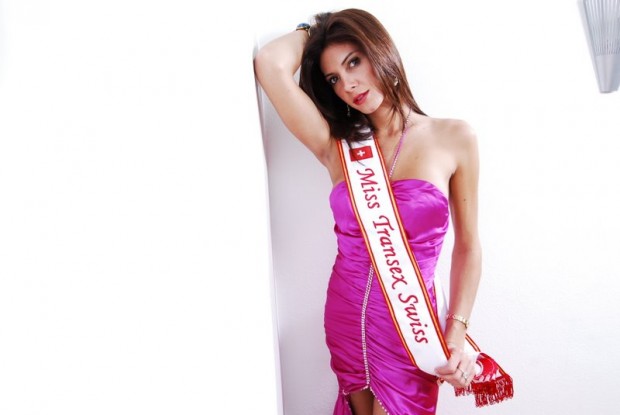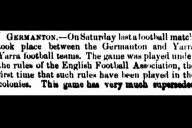What do I, the Socceroos, and Miss Trans Star 2010 all have in common?
Apart from similar reproductive organs, perhaps not much. However, we all made an appearance at this year’s World Cup in some capacity, and in an obscure way we now share that particular connection.
And it all began with Tinder.
After Josh Kennedy nodded in that goal against Iraq to seal Australia’s qualification for the World Cup, three mates and I set our sights on a trip of a lifetime to Brazil via Europe. Unfortunately, one friend was accepted into an interstate Masters degree he couldn’t defer, and in a classic case of bad short-term decision-making, chose education and future prospects over the World Cup.
Fast forward some months and two quick stops to Amsterdam and Lisbon, and our crowd of three landed in Recife, northeast Brazil, where the FIFA ballot allocated us two matches, along with another two in nearby Natal. After doubling up on tickets to the Italy vs Costa Rica game, we looked to offload the additional seats.
This is where Tinder makes a crucial appearance.
One mate, a casual user of the more instant, seedier eHarmony alternative, found that Brazilians took fondly to the mobile application. A conversation with a potential lady suitor led to a ticket sale.
On game day we met up with our three new acquaintances, now accompanied by an extra friend with a ticket to a different seat. Six-foot, dark, and exhibiting a flawless hourglass figure, she seemed to relish the spotlight as passers-by visibly gave her the once-over. Engaging in some language barrier-affected small talk, mystery girl introduced herself as Bruna, working in Switzerland – without revealing her occupation – but returning to Brazil for the World Cup.
Bruna had a noticeably deeper, raspier voice, and at that point we considered there might be something unique about her. Admirers continued to flock to Bruna like moths to a flame, asking her to pose for photos. Was Bruna someone famous, or merely a blessing for creepy, middle-aged men devoid of female eye-candy at a tournament dominated by male attendees?
We didn’t see Bruna until after the game. One girl we met from a different group, evidently not Bruna’s biggest fan, blurted out, “You do realise she’s a boy? You’re not gay, are you?” It was a shame we found out about Bruna this way, as in hindsight, most Brazilians were accepting and progressive towards individual sexuality. We dismissed hater girl’s sentiment; still buzzing after Costa Rica put away old foe, Italy. The rest of our encounter passed mostly uneventfully, as despite our mate’s Tinder match giving him a sultry kiss and asking for a rendezvous, we had to travel south the next day.
It was only until a couple of weeks later, when reminiscing about our travels to date, that the mystery surrounding Bruna’s identity surfaced again. Who was she, and why was she so popular? A speculative ‘bruna transgender recife’ Google search yielded more results than we bargained for. She turned out to be Bruna Geneve aka Cabral, a Swiss-Brazilian transgender model, escort and winner of the 2010 Miss Trans Star Internacional.
We also uncovered accompanying images; the type that internet filters are designed to protect underage viewers from.
All we kept thinking was that this was our brush with fame and we didn’t even know it. Of all the potential footballers, media or other celebrities we thought we remotely had a chance of seeing in person on the trip, a transgender supermodel was not the obvious candidate. Seeing Francis Leach at the Green and Gold Army tour was mediocre compared to this. Our biggest regret was not taking a photo with her, when so many others did. With the opportunity gone, to paraphrase Tenacious D, it was the best minor celebrity encounter in the world. Look into my eyes and it’s easy to see…

That was one of my more vivid World Cup tales. But of course, we were there to support the Socceroos, and Brazil also really rekindled our love for the national team after a turbulent few years.
Our first Australian football encounter in a foreign place was at Amsterdam airport, where a Starbucks employee noticed our immaculate Australian jerseys. He playfully quipped that Australia were doomed, and that Holland would destroy us. I didn’t take too kindly to the gesture and like Joe Pesci’s character Tommy brazenly shooting down Spider in Goodfellas after being insulted by the latter, with my two mates laughing obnoxiously, I pulled out a gun and left this shmuck in a pool of blood.
Okay, maybe that didn’t happen – we all just kept laughing timidly because we anticipated the same fate.
But that was the first moment I remember realising how special it felt having a foreigner even talk about Australian football on a global scale. It was comparative to what I imagine a parent’s pride to be when somebody talks positively of their child, not that he was being overly complimentary. I’m sure our Dutch coffee pouring detractor had his heart in his mouth for the majority of the Australia vs Netherlands game. The future hope is that we change from praising honourable losses to celebrating expected wins.
Personally, the thought of it is truly monumental – a nation like Australia, where football is often marginalised, if not even stigmatised, performing admirably on the biggest stage in football, against the best nations and players in the world.
For Australia’s first game against Chile, we met up with Shoot Farken’s very own Athas at a bar in Natal, accompanied by Mexican fans – who had just seen their team open their account with a win over Cameroon – graciously cheering us on as we lost 3-1 in an emotional rollercoaster. After the game, one Mexican said, “Your team may suck (cue another Goodfellas moment), but at least you get to go home and live in comfort. Most of our people return to poverty.” Perspective.
In Curitiba, we found out we were staying a street away from the Australian team motel. We saw them arrive by bus, accompanied by a police motorcade, with locals shouting out for ‘Timmy’. Journalists packed the area. The world was watching. Okay, so seeing the national team metres away in the flesh was probably more exciting than the Bruna Geneve discovery. In the proceeding game against Spain, along with many other Aussies who could not get match tickets, we flooded an empty sports bar in Curitiba like a dam spillway and turned it into a stream of green and gold. For once, shamelessly chanting “Aussie, Aussie, Aussie, Oi, Oi, Oi” in a footballing context was not a cringeworthy experience.
Those were the types of moments throughout the World Cup that made me feel enthusiastic for the Socceroos again. Ange had worked his wonders against the odds, despite results not going our way. The amusing pronunciation of Australian surnames; the South American “GOOOOOOOOL’ commentary following each of our three goals for the tournament; and Tim Cahill’s chart-topping volley and subsequent replays all reminded us of the minor but commendable mark Australia left on the World Cup.
In turn we noticed a change in attitude from locals and other foreigners to Australians travelling to Brazil. From looking on curiously, as if questioning why we bothered rocking up when our team had as much chance of a positive result as Sepp Blatter did to stepping down, to showing some admiration and understanding. It also helped that Australia’s colours were similar to Brazil’s, with the novelty making it easier to mingle and converse with locals.
So really, what do I, the Socceroos, and Miss Trans Star 2010 Bruna Geneve all have in common?
Well, there’s Spain crashing out of the Cup early; Costa Rica finishing on top of a group consisting of Italy, Uruguay and England; Luis Suarez’s bite; James Rodriguez announcing himself on the world stage; a certain 7-1 scoreline; Messi coming so close to settling the Messi vs Ronaldo debate once and for all; and the Germans finally breaking through to win the World Cup after years of coming close.
The unity of an event that momentarily takes one away from the world’s sad ability to keep on committing atrocities.
Some other arbitrary observations:
- In Rio, you will meet up with your mate’s 55-year-old uncle who will rock harder than all of you at a bar in Lapa, the party district. There, a cover band playing western songs will claim they have one song to go, before playing an encore of ten.
- Still in Rio, you will notice the Portuguese word for thank you – obrigado – works well when sung to the tune of the Wiggles’s ‘Hot Potato’. Sing this in public and you’ll engage some 50+ year old women in conversation, who will ask you if you like Brazilian butts, have spare tickets, and want to come back for a drink. After politely declining, you’ll bump into them on the streets a few more times and it will be awkward.
- Despite the warnings, not all Brazilians are pickpockets or criminals. A girl may tell you in a Curitiba fanfest that “while you’re watching the game, 1000 guys are watching your wallet”, but you probably won’t get pick-pocketed, unless you are a ‘papaya’, who makes themselves an easy target by flashing their belongings around.
- In Iguazu, you’ll make friends with a Columbian guy who will go out to dinner with your group, not have money to pay for himself, tell you he’ll wire the money electronically to you, and never do.
A big thank you to Rincon Photos for the photos of Bruna.
















